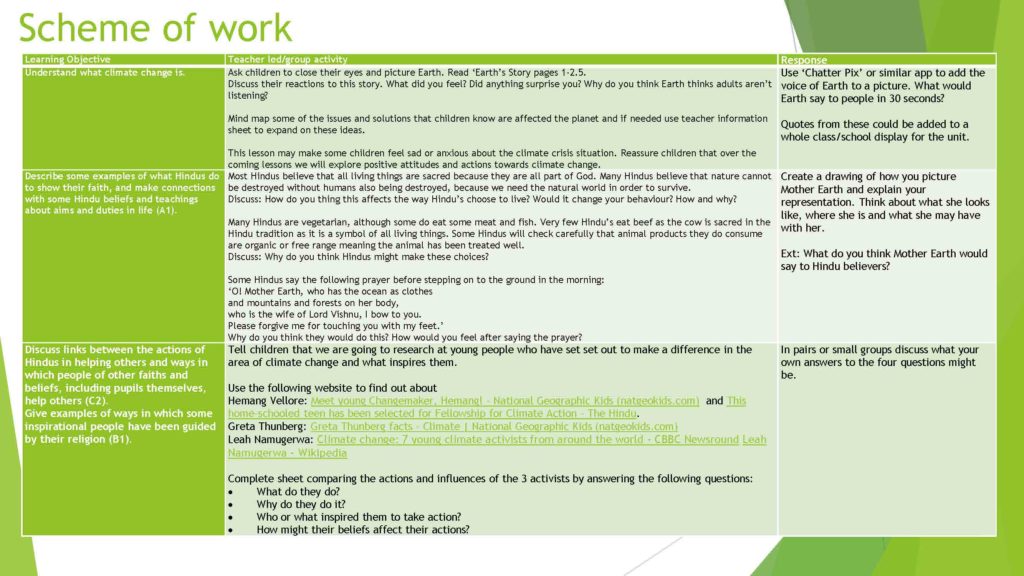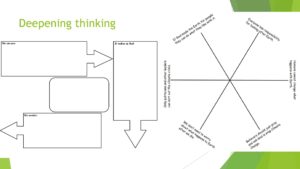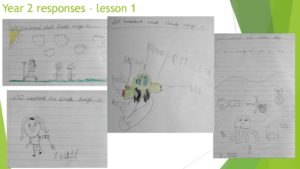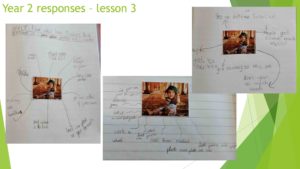Zoe Higgins
RE Connect: RE and Climate Crisis Teacher Fellowship Programme
I had been teaching for 19 years, mainly in KS2, when I spotted the opportunity to join a teacher fellowship run in partnership with Dr Jeremy Kidwell, Senior Lecturer in Theological Ethics at the University of Birmingham and Dr Ian Jones of St Peter’s Saltley Trust. The fellowship was designed to give teachers a deeper knowledge and understanding of the climate crisis with a focus on religion and worldviews and lead to projects about how to transfer this learning into classroom practice. A teacher fellowship is a part time project, in this case 7 online evening sessions and 2 full days over 9 months, which enables teachers to work closely with researchers and specialists on transforming practice in a particular area. Having been RE Lead for over 10 years, Global Lead for 3 years and with a keen personal interest in climate issues I applied straight away. My school is a Church of England VA school in a large village setting and part of a diocese MAT. There are 320 pupils on role from Reception to Year 6 with 25% of these children coming from out of catchment. The majority of the children are White British.
The fellowship provided opportunities to hear from specialists, beginning with an introduction to the science behind the current climate situation which left me well informed, a little overwhelmed but also inspired by the knowledge. My main thoughts were; if this is what the Science is telling us, I need to continue with this project and find ways to include the climate crisis in my teaching of RE. Over the next few sessions we heard from a member of Extinction Rebellion Muslims, a Professor of Sikh Studies, a member of Young Christian Climate Network which explained how some Muslims, Christians and Sikhs are responding to the Climate Crisis and how their beliefs impact this. Again, more food for thought about how this could be shared with pupils and used to help them consider their own responses.
The next few sessions were more focused on pedagogy with Jeremy Kidwell speaking about ethics and culture, Lat Blaylock exploring classroom practice with the group, Ian Jones discussing Religion, Climate Change and the Affect. We tried scriptural reasoning with Nick Adams and went on to hear about creative and experiential ways of teaching and learning in RE. In our final session together we were inspired by Justine Ball, an adviser/inspector for primary RE in Hampshire, about an art project she had done with local schools focusing on climate changes and Charlie Syson, a secondary teacher, who has been developing a scheme of work on less widely taught religions as part of a Farmington Scholarship. Throughout the months of the project we were also provided with suggested reading and watching which provided further background knowledge and food for thought.
With all this content the difficulty was narrowing down what my individual project would look like as I came away with ideas and new knowledge after every session. I finally settled on a scheme of work with a set of accompanying photo cards. The scheme of work would focus on how people’s religious beliefs influence their thoughts and actions about climate change. I used key enquiry questions for each key stage to frame the learning; ‘What do people love about Earth and how do they look after it?’; ‘Why does caring for the world matter?’; ‘What do different people do to care for the world and why do they do it?’; and ‘How do beliefs influence people’s responses to the climate crisis?’. The scheme of work would include 6 lessons for Reception, Key Stage 1, Lower Key Stage 2 and Upper Key Stage 2 and could be used as a half term’s block of work or as RE focus week. I also wanted to include the photo cards and some accompanying resources that could be used without the scheme of work.
When trialling some of the resources and lesson plans, I found that all of the children were engaged and excited about the learning and when using the photo cards they found havingpictures of real people inspiring and interesting. In the initial y1/2 lesson, which looked at what climate change is, the children were very eager to discuss their ideas. What I also found was that the y4 children looking at the photos needed some structure to help them focus their discussion about encourage deeper thinking. With the y1/2 lessons, the teachers who trialled the first two lessons found them easy to use and appropriate in length and activity but found that the children lacked some subject knowledge to fully access the lesson.
At this stage, I have a working scheme of work and accompanying resources, which I will continue to develop based on trialling and discussions with the teacher fellows and RE specialists who met in person on the official final day of the fellowship. The aim is that this will be shared more widely allowing other schools to include a focus on RE and Climate Change within their curriculum. Being part of the fellowship has been an opportunity to focus my time and thinking on RE and about the importance of including climate change. The opportunity to work with others who are passionate about both RE and raising awareness about climate change amongst young people really has been inspiring.
For further information or to discuss the project please email: zhiggins@scargill.derbyshire.sch.uk
 Zoe Higgins Teacher and Religion & Worldviews Lead
Zoe Higgins Teacher and Religion & Worldviews Lead



